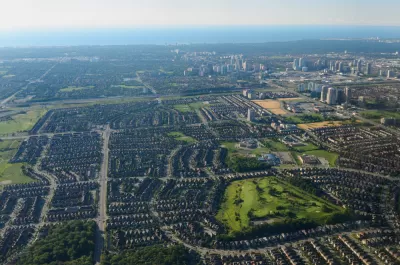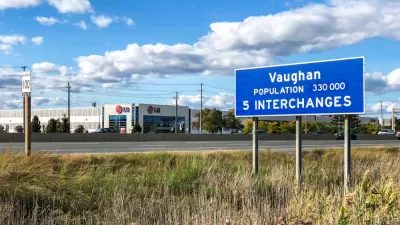An old way of doing municipal business—generating development fees by opening farmland to development—is no longer paying dividends. Mississauga, Ontario serves as a cautionary tale for the bottom line of sprawl.

Mississauga, Ontario developed horizontally for decades. Now some say it should serve as a cautionary tale as parts of the province consider whether to expand urban growth boundaries.
Oliver Moore reports on the moment of reckoning in Mississauga, Ontario, where developments are planned on the final pieces of untouched land in the city.
"The city was once a bedroom community of Toronto so synonymous with suburbia that its long-time mayor was known as the Queen of Sprawl," according to Moore. While the city has started to build up, it also continued to build out.
The story of sprawl is common in Southern Ontario, according to Moore. "Sprawl is also being embraced enthusiastically still by city leaders across Southern Ontario. And as provincial politicians at Queen’s Park push for the expansion of many municipal boundaries, in the name of helping home affordability, observers warn that Mississauga’s experience should be a red flag." Opponents of ongoing sprawl say that previous development patterns were made in a different era of car dependence, and the time has come to "fix the expensive mistakes of the past."
The article includes documentation of how expensive Mississauga has become: "With diminishing prospects for more sprawl – and the associated fees it generated – Mississauga in 2012 instituted a special levy to try to pay down the snowballing bill for infrastructure repairs. Property taxes also started to rise dramatically in the same decade."
In November, regional leaders in the York region, located on the other end of the Toronto metropolitan area, voted to change the designation of 1,400 acres of its greenbelt from agricultural to rural.
FULL STORY: Mississauga a ‘cautionary tale’ as cities sprawl out across Southern Ontario

Alabama: Trump Terminates Settlements for Black Communities Harmed By Raw Sewage
Trump deemed the landmark civil rights agreement “illegal DEI and environmental justice policy.”

Study: Maui’s Plan to Convert Vacation Rentals to Long-Term Housing Could Cause Nearly $1 Billion Economic Loss
The plan would reduce visitor accommodation by 25% resulting in 1,900 jobs lost.

Planetizen Federal Action Tracker
A weekly monitor of how Trump’s orders and actions are impacting planners and planning in America.

Wind Energy on the Rise Despite Federal Policy Reversal
The Trump administration is revoking federal support for renewable energy, but demand for new projects continues unabated.

Passengers Flock to Caltrain After Electrification
The new electric trains are running faster and more reliably, leading to strong ridership growth on the Bay Area rail system.

Texas Churches Rally Behind ‘Yes in God’s Back Yard’ Legislation
Religious leaders want the state to reduce zoning regulations to streamline leasing church-owned land to housing developers.
Urban Design for Planners 1: Software Tools
This six-course series explores essential urban design concepts using open source software and equips planners with the tools they need to participate fully in the urban design process.
Planning for Universal Design
Learn the tools for implementing Universal Design in planning regulations.
Caltrans
Smith Gee Studio
Institute for Housing and Urban Development Studies (IHS)
City of Grandview
Harvard GSD Executive Education
Toledo-Lucas County Plan Commissions
Salt Lake City
NYU Wagner Graduate School of Public Service



























